Key Takeaways
Vaccinations are one of the most important ways to protect your puppy’s health, starting from their earliest weeks of life. Following a proper schedule shields them from serious diseases like parvovirus, distemper, and rabies, while also helping prevent the spread of illness in the community. By partnering with your veterinarian, you can keep your pup on track, address any concerns, and give them the healthiest start possible.
Table of Contents
Why Puppy Vaccinations Matter
What Vaccines Do Dogs Need?
Lifestyle & Optional Puppy Vaccines
Puppy Vaccination Schedule
Puppy Vaccination Prep & Aftercare
Common Puppy Vaccination Questions & Concerns
Partnering with Your Veterinarian
Bringing home a new puppy is an exciting – and sometimes overwhelming – experience. There’s a lot to learn! One of the most important responsibilities you’ll have as a new pet parent is preventative care, which is where vaccinations come in.
Vaccines are more than just a checklist item at the vet, they’re a vital part of your puppy’s long-term health and wellbeing. In this guide, we’ll walk you through what vaccines your puppy needs, why they matter, and how staying on schedule can help your furry friend live a happy, healthy life.
Why Puppy Vaccinations Matter
Puppies are naturally curious and eager to explore the world, but their immune systems are still developing. This makes them especially vulnerable to viruses and bacteria that can cause serious illness. Diseases like parvovirus, distemper, and rabies aren’t just dangerous – they can be life-threatening.
Vaccinations give your puppy’s immune system the tools it needs to recognize and fight off these diseases before they can take hold. By starting vaccinations early and keeping them on schedule, you’re giving your puppy the best defense against common but preventable illnesses.
There’s also a community benefit: when more pets are vaccinated, it reduces the spread of disease overall. That means your puppy is safer when they meet other dogs at the park, during walks, or even just out and about around Fort Mill.
What Vaccines Do Dogs Need?
Not all vaccines are optional, some are considered “core” because they protect against the most dangerous and widespread diseases. These are the vaccines every puppy should receive, regardless of breed, size, or lifestyle. Our vaccination recommendations follow American Animal Hospital Association canine guidelines. (The AAHA is like the veterinary equivalent of the American Academy of Pediatrics for children.)
Distemper, Adenovirus, Parvovirus, and Parainfluenza (DHPP/DA2PP)
Often given as a combination shot, this vaccine protects against several serious illnesses:
- Distemper affects a dog’s respiratory, digestive, and nervous systems and is often fatal.
- Adenovirus (Hepatitis) can damage the liver, kidneys, and eyes.
- Parvovirus is a highly contagious and life-threatening gastrointestinal disease, especially dangerous for young puppies.
- Parainfluenza contributes to respiratory infections and spreads quickly in social settings. This vaccine is given in a series starting at six to eight weeks, with boosters every few weeks until about 16 weeks of age.
Leptospirosis
Leptospirosis (or “lepto”) is a bacterial disease spread through water or soil contaminated with the urine of infected wildlife. Because it can also affect humans, the lepto vaccine for dogs provides protection for your whole family. Some dogs may experience mild lepto vaccine side effects, such as temporary soreness or fatigue, after this vaccine, but the benefits far outweigh the risks, especially in areas where lepto is common.
Rabies
Rabies is a fatal viral disease that can be transmitted to humans, which is why the rabies vaccine is required by law. Puppies typically receive their first rabies shot around 12-16 weeks, followed by a booster at one year, and then every one to three years.
These core vaccines form the foundation of your puppy’s health defense. Once your puppy is fully vaccinated, you’ll have peace of mind knowing they’re protected against the most serious threats.
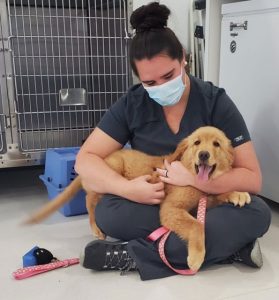
Lifestyle & Optional Puppy Vaccines
Some puppies benefit from additional protection depending on their lifestyle, environment, and exposure risks. These vaccines aren’t necessary for every dog, but we may recommend them if your puppy will be social, active, or frequently around other animals. What’s optional for one puppy may be essential for another. We can help you decide which vaccines make sense for your pup.
Bordetella (Kennel Cough)
Bordetella is a highly contagious bacterium that causes upper respiratory infections, often referred to as “kennel cough.” If your puppy will be boarding, attending daycare, grooming appointments, or even going to dog parks, the bordetella vaccine for dogs is strongly recommended. It helps prevent the hacking cough and potential complications that come with this infection.
Canine Influenza (Dog Flu)
Canine influenza is a contagious respiratory virus that can spread quickly anywhere dogs gather, such as boarding facilities, daycare, grooming salons, and dog parks. Symptoms often resemble kennel cough, i.e. coughing, sneezing, nasal discharge, and lethargy, but can progress to more serious illness in some dogs. The dog flu vaccine doesn’t guarantee complete protection, but it significantly reduces the severity of illness and helps limit the spread to other dogs.
Lyme Disease Vaccine
Ticks are common throughout South Carolina, thanks to our wooded landscapes and subtropical climate, and dogs living in tick-heavy areas greatly benefit from Lyme vaccination. This vaccine typically starts with two initial doses spaced a few weeks apart, followed by annual boosters.
Puppy Vaccination Schedule
Here’s a simple breakdown to keep handy as your puppy grows.
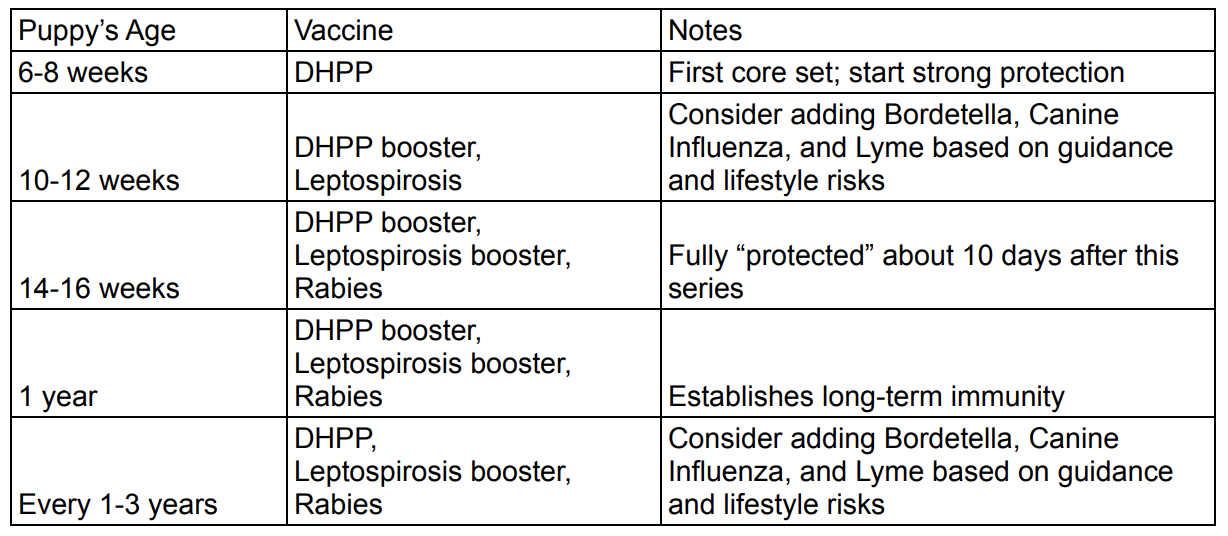
Puppy Vaccination Prep & Aftercare
A trip to the vet doesn’t have to be stressful for you or your puppy. Our Fear Free team members promote a comfortable experience for your pet while they’re here, and there are things you can do ahead of time and after your visit that can make vaccinations a smoother, more positive experience.
Before the Appointment
- Bring comfort items: A favorite blanket or toy can help your puppy feel safe in a new environment.
- Plan for a calm visit: Try to schedule your appointment when you’re not rushed, so your puppy picks up on your calm energy.
- Ask questions ahead of time: If you’re unsure about which vaccines your puppy will be receiving, jot down your questions and bring them with you.
After the Appointment
- Watch for mild reactions: It’s common for puppies to be a little sleepy or sore at the injection site for a day or so.
- Know what’s not normal: Contact us right away if you notice vomiting, diarrhea, swelling, or difficulty breathing.
- Provide rest and comfort: Give your puppy time to relax after their visit and plenty of fresh water.
Common Puppy Vaccination Questions & Concerns
These are the most common questions we hear during puppy visits. Have others? Ask us! Our practice is built on relationships – we want to hear all of your questions, concerns and ideas, so that, together, we can give your pup the best start.
How many times must a puppy be vaccinated?
Puppies usually receive three rounds of their core vaccine series (DHPP) plus a rabies shot around 16 weeks. Boosters are given at one year, and then typically every one to three years.
How many shots do puppies need before going outside?
Your puppy should complete the full series (usually finished at 15-18 weeks) before visiting dog parks, pet stores, or other high-risk places. Safe, controlled socialization, like short walks in low-risk areas, may be appropriate earlier.
Can I walk my puppy after the second vaccination?
After the second DHPP vaccination, your puppy has some protection, but not full immunity. Avoid high-traffic dog areas until the final booster is complete. Ask us about safe ways to begin socializing in the meantime. Keep in mind, immune system response lags behind any vaccine by approximately two weeks.
How often do dogs need the rabies vaccine?
Puppies get their first rabies vaccination at about 16 weeks, with a booster at one year, and then additional boosters every one to three years depending on the vaccine administered.
Are there side effects to vaccines?
It’s common for puppies to be a little sleepy or sore after a vaccine. Rarely, more serious reactions like facial swelling, vomiting, or difficulty breathing can occur. If you see these signs, call us immediately.
How much do puppy vaccinations cost?
Costs can vary depending on the vaccines given and your puppy’s needs. As a general rule, vaccines cost between $20 and $40 each or $100 to $200 for a full puppy series package. While there is an upfront investment, vaccines offer the best long-term protection for your pet’s health.
What happens if you’re late on puppy shots?
If your puppy misses a scheduled vaccine, don’t panic. We will create a catch-up plan – there’s no need to start over. The key is to get back on track as soon as possible.
What’s a titer test?
A titer test checks your dog’s blood for antibodies to see if they’re still protected against certain diseases. It can sometimes be used instead of automatic boosters, but required vaccines like rabies still must be given by law.
Partnering with Your Veterinarian
Every puppy is unique, and so is their vaccination plan. While general guidelines are helpful, the best way to protect your pup is by working closely with your care team. At Fort Mill Animal Hospital, we take into account your puppy’s age, breed, lifestyle, and health history when recommending vaccines.
We will not only administer the vaccines, but also help you:
- Stay on schedule by reminding you of upcoming boosters.
- Tailor protection with optional vaccines like Bordetella or Lyme based on your puppy’s environment and activities.
- Answer questions about side effects, safety, and how to balance early socialization with disease prevention.
By following the recommended schedule and partnering with your veterinarian, you’re giving your new best pal the very best chance at a long, happy life. Ready for your puppy’s first vet visit? Schedule an appointment today – we can’t wait to meet your latest addition!

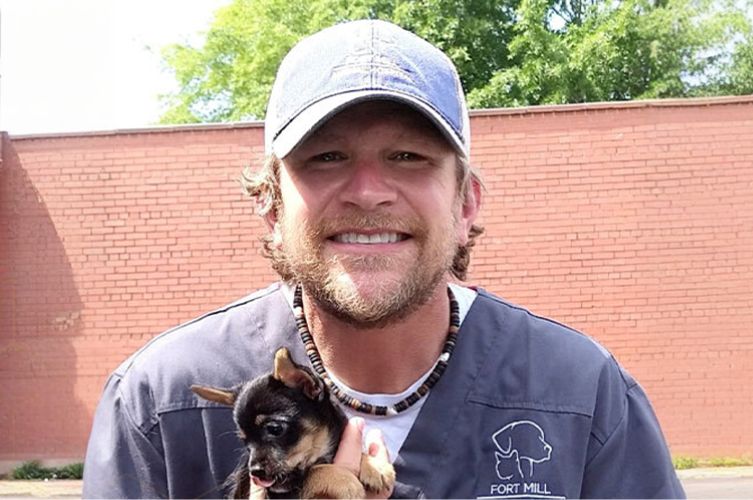

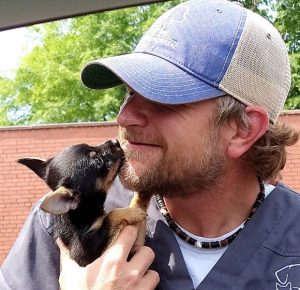
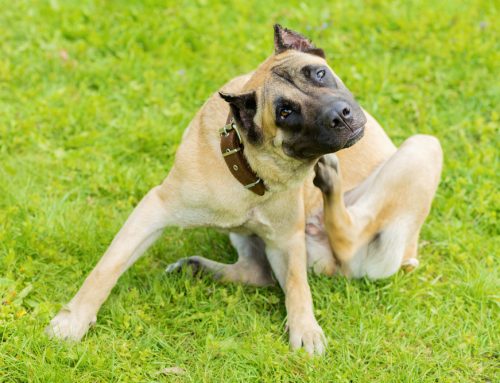


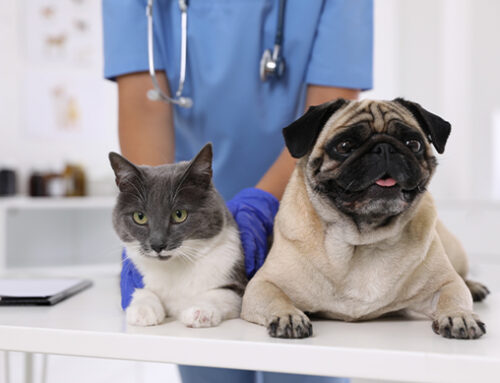

Leave A Comment